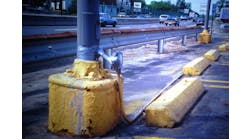Cancelled projects, manufacturing overruns, and warehouse liquidations can generate a truckload of surplus inventory. While a majority of this electrical equipment is sold through local surplus dealers, e-commerce has opened up a new way of doing business.
David Rosenfield, president of ROMAC, City of Commerce, Calif., estimates that the surplus electrical industry tops $1 billion. In the past five years, an increasing number of dealers have started listing their inventories on their Web sites, selling equipment online, or trading their goods in Internet auctions.
“The Internet is an awesome way to sell a product because you can really get close to what you're buying,” Rosenfield says. “I've been doing this for 35 years, and in the past you had to fly to where the material was, assuming it was out of your immediate territory, or you had to take your chances by way of verbal descriptions and a few Polaroids.”
Two years ago, electrical contractors could buy and sell slow-moving, obsolete, and obscure equipment on about two-dozen electrical e-commerce sites. While many of those online ventures have all but vanished, it's still possible to unload surplus equipment through Internet auctions, Web bulletin boards, and online directories. One of those directories, Surplus Record, has been published for eight decades. In 1995, when many companies were first becoming aware of the Internet, the publication had already launched a comprehensive Web site at www.SurplusRecord.com. Today, 170,000 subscribers, from electrical contractors to manufacturers, can search for surplus electrical and power equipment online. Surplus Record also offers a free service to electrical contractors to sell their surplus equipment. If contractors overestimate the amount of material needed for a job or wind up with extra inventory after a project has been cancelled, they can post the items for sale on the directory's bulletin board.
“The Internet has made the world a smaller place,” says Tom Scanlan, publisher of Surplus Record. “Traditionally, electrical contractors would call their local surplus dealer if they wanted to buy or sell equipment. Now they can post an item on our Web site and get proposals from dealers all over North America.”
About 1,000 surplus dealers list more than 60,000 pieces of equipment on the Surplus Record Web site, which allows them to update their records daily, communicate instantaneously with their buyers through e-mail, and sell more equipment, Scanlan says.
“Electrical dealers are selling more surplus equipment online than they ever have before,” he says. “Back in 1995, few dealers, if any, had exposure to the Internet until we brought them into it. They were not very open to embracing the Web, but we convinced them that this was the future.”
While about 80% of the directory's advertisers have an online presence, only about 5% sell equipment directly from their Web site. Instead of serving as an e-commerce tool, Surplus Record operates as an independent marketplace to connect buyers with sellers. Another surplus directory, Electrical Advertiser (www.ea-online.com), also lists electrical equipment from more than 450 manufacturers, dealers, and suppliers.
While the online directories provide information on where to buy surplus electrical equipment, a handful of auction sites offer e-commerce capabilities. Large lots of transformers and heavy industrial equipment are sold on FreeMarkets Asset Auctions (www.AssetAuctions.FreeMarkets.com), where contractors, dealers, and manufacturers bid on surplus equipment offered by Fortune 1000 firms.
Smaller electrical contractors who are looking for a limited quantity of electrical supplies, however, can search for everything from vintage wiring books to transformers on eBay, an online marketplace with 49.7 million registered users (eBay Basics on page C10). While the site is geared more to do-it-yourselfers and consumers than professional contractors, an increasing number of surplus dealers, such as Denver-based Rocky Mountain Surplus, are selling electrical surplus through eBay. President Rockne Rhodes says his company launched an eBay electrical store a year-and-a-half ago, hired a full-time employee to set up and track eBay auctions, and bought four digital cameras to take photos of the surplus equipment. Today, his business attracts customers from around the world.
“It keeps growing and expanding,” Rhodes says. “We have noticed a lot more international sales with eBay. I'm sure it will be routine five years from now where we'll be selling surplus electrical equipment to customers all over the world. It's a slowly evolving marketplace, but it's very efficient.”
Rhodes opened an eBay store not to sell truckloads of surplus inventory, but rather to track customers and pull in new business. While an electrician or distributor may not find the exact item they're looking for in Rhodes' online store, they often call his company to ask if they have an alternate item in stock. eBay, which launched in 1995, has added new categories such as circuit breakers and transformers due to the increased demand for electrical equipment in the last few years. Rhodes says surplus dealers need to consistently list items on eBay before a market can get off the ground.
“We put transformers up on eBay and we weren't getting any sales for a couple of months, but we kept listing them,” Rhodes says. “All of a sudden, it just took off, and we were selling a ton of them. It's a catch-22. Someone has to be out there doing it. Once they start putting the stuff up there consistently, it eventually attracts a crowd.”
Some surplus dealers, however, haven't yet jumped on the Internet bandwagon. Rhodes says many of his counterparts may be afraid of new technology or reluctant to make the upfront investment of time and money.
“They like their way of doing business because they are used to it,” Rhodes says. “They don't realize that the way they are doing business now is going to change in the future because of the Internet. You can't stop it. Those people who choose not to evolve will not be in business 10 years from now.”
What to Ask Before Buying Online
David Rosenfield advises contractors to e-mail the seller to find out as much information as possible before bidding on electrical equipment online. Here are a few questions to steer you in the right direction.
- Is this an original factory product?
- Is the product new and in the box?
- Does it have any cracks, marks, or fractures in its case?
- Does it exhibit any indication or symptoms of having been burned in any way?
- What kinds of tests do you use to ensure the safety and reliability of the product?
- When was the last time this product was in service?
- Has it ever failed?
- Is there any warranty in the event that the product arrives and is dead on arrival?
- Can I return the product if I'm not satisfied with it?
Get What You Pay for on the Net
Electrical contractors should always remember the common phrase, “caveat emptor” or “let the buyer beware” when purchasing electrical equipment online, says David Rosenfield, one of the founders of the Professional Electrical Apparatus Recyclers League (PEARL), a trade association for surplus dealers.
“The caution that I would offer to anybody about buying on the Internet is that if you don't go out of your way to verify the product, you could get a bag of junk,” Rosenfield says. “The worst thing about trading online is that people demand cash in advance more often than in any other venue. One of the shortfalls of buying on the Internet is that you have a tendency to forget that you're still dealing with humans and not just a computer screen.”
If possible, contractors should ask the seller a lot of questions before placing their bids on an auction site. Sometimes, however, they won't find out they got a lemon until after they've already won an auction, paid the seller, and opened up the package. For example, Rosenfield learned a valuable lesson when he unknowingly bought a counterfeit circuit breaker on eBay. Someone had re-marked a trip unit to look like an original factory device, and the seller couldn't tell the difference. Because of how easy it is to silkscreen a new product label and how difficult it is to spot a fake, some counterfeit products can slip through the cracks on Internet auctions.
“In the used equipment business, counterfeiting has been a problem for a long time — long before there was eBay or any other Internet marketing tools,” he says. “When we caught the problem with the circuit breaker, we sent it back and the seller was good enough to make it right for us.”
Rosenfield says one time, however, he bought a diesel gen set on eBay, but wound up with unusable merchandise and no way to return it.
“I was promised that the unit was pristine and recently removed from a hospital installation,” Rosenfield says. “When I received it, it had a cracked engine block. It was junk. It's rusting in my backyard now. The seller wouldn't help a bit.”
eBay has since implemented a fraud protection program. If a buyer contacts a seller and the dispute isn't resolved within two weeks, then the buyers can contact their credit card company, which may offer 100% online protection. They can also use an online mediator, such as Square Trade, which is offered free of charge to eBay buyers. Next, buyers can file a fraud alert and if necessary, a protection claim. If the problem is still not addressed, buyers can contact law enforcement agencies such as the National Fraud Information Center or the Internet Fraud Complaint Center.
The Surplus Record, an online directory, also keeps a watchful eye on any suspicious activity. When a buyer alerts the directory about a surplus dealer who is trying to sell counterfeit or misrepresented electrical equipment, the Surplus Record will confront the dealer, ask to see some paperwork, and pull the company's advertising if the buyer's assertion is found to be true.
“We had an advertiser who spent more than $4,000 a month with us who was caught changing nameplates on transformers,” says Tom Scanlan of the Surplus Record. “He was selling 500kVA transformers at 750kVA and 2,000KVA transformers at 2,500KVA. We asked him to take his advertising elsewhere, and he never got back in.”
Whether you're purchasing electrical equipment on eBay or through a surplus dealer's Web site, remember to always ask a lot of questions before bidding on an item and inspect the merchandise carefully upon arrival. Taking a few extra minutes to research a company and its products can save you hours of frustration, mounds of paperwork, and the expense of litigation in the long run.
eBay Basics
How to register
-
Visit eBay.com and click on the button, “Register Now.”
-
Enter your contact information and create a user name and password.
-
Accept the user agreement.
-
Check your e-mail. eBay will send you a link that you can use to complete your registration. You can then return to the eBay home page and start bidding.
Bidding on an item
To place a bid on an auction, follow these steps:
-
Search for an item by typing keywords into eBay's search engine.
-
Select one item from the listing and preview the description.
-
Enter your maximum bid in the bid box at the bottom of the page.
-
Enter your user name and password and click the “place bid” button. eBay will then automatically bid incrementally on your behalf until it reaches your maximum bid. If you are outbid, eBay will notify you by e-mail so you have the opportunity to increase your bid before the end of the auction. If you're the winning bidder, you'll receive an e-mail alert informing you to contact the seller with your shipping address. For faster shipping, you can sign up for PayPal, an online payment service.
eBay's safe trading tips
Contractors can learn about a seller's reputation before placing a bid. Each eBay seller has an online feedback profile, which includes comments from previous buyers and a numerical rating. Sellers receive:
+1 point for each positive comment
0 points for each neutral comment
-1 point for each negative comment
If the seller has a high number after their user ID, it means they've earned lots of positive feedback. If that number is extremely low, they either don't have much experience selling on eBay, or they've received negative feedback. In that case, be careful and ask a lot of questions before placing a bid.


